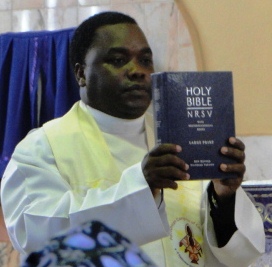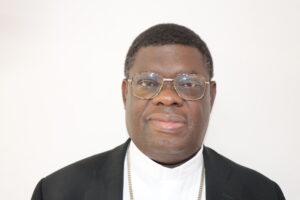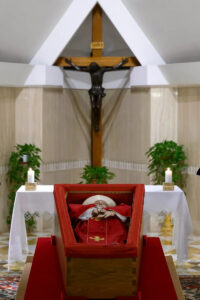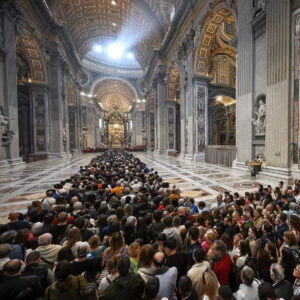AMECEA: A Church Not on Holiday: A Priest’s Reflection on Pastoral Care During COVID-19

Fr Emmanuel Chimombo, AMECEA Pastoral Coordinator
Fr Emmanuel Chimombo, AMECEA Pastoral Coordinator
With the current situation of COVID-19, various institutions including schools, Churches and other public places were closed. For a Catholic priest and parishioners, the most disturbing of all has probably been the call to cancel Church worship services.
I recall one priest recently saying, “All Churches have now been closed more than thirty days. I have had many friends die during this plague. For me, it is sad and exhausting because I am not able to minister in person to those grieving. This has never happened in my life; it is a very strange moment in history.”
Indeed, grief is engulfing the Church at different levels. For a priest, losing someone due to this pandemic and being unable to hold a memorial service is a painful experience. Others are very ill, lonely and he may not be able to visit them. At socio-economic level, his parishioners are losing their jobs; children are missing the social life and stability which they enjoy in school but also at the parish. Everything is turning upside down.
But now, as a shepherd, a priest needs to do what he can to remind his flock that they are not alone. Despite the isolation imposed by social distancing measures, “thought and spirit can go far with the creativity of love,” said Pope Francis in his 2020 Holy Week message.
“Let us try, if we can, to make the best use of this time; let us be generous. Let us help those in need in our neighborhood. Let us look out for the loneliest people, perhaps by telephone or social networks. Let us pray to the Lord for those who are in difficulty within our respective countries and in the world at large,” Pope Francis reiterated.
Taking heed to the call by the Holy Father and having consulted widely what is happening in various religious quarters of the world as they respond to the COVID- 19 pandemic, one thing is outstanding: No Church personnel is on holiday. Just as the society has changed the mode of operation, priests too, while observing physical distancing, ought to style up and remain close and relevant to their people.
Thinking about it and seeing what other priests are already doing in different parts of the world, I find the following as pastorally helpful tips to share with fellow pastoral workers and the faithful so as to keep on “being the Church,” even when activities cannot be done in the Church building.
The Priest
Despite restrictions to physical interaction, a priest must adhere to what in normal circumstances he considers as office hours. In this our digital world, it is possible via zoom, Facebook, WhatsApp, Phone Calls or any preferred ways. Through these platforms, a priest can continue to be available to his people and attend to their needs just as he does on his ordinary office day.
Another important thing in the life of a priest is praying for the Church. As a pastor, a priest must continue to offer a daily prayer or meditation for the faithful. Their prayer intentions can be sent to him via the same platforms – WhatsApp, email or Facebook. He has to consistently invite people to send him their prayer intentions, hence staying connected with his parishioners. Let them feel that their priest is concerned about their day to day life situation.
Again, a priest has a role to play in keeping the parishioners inter-connected and engaged. In the first place, the priest himself should be connected with his leadership team but also all the medical caregivers within the parish – doctors, nurses, clinicians including having phone numbers of health centres and referral hospitals in respective parish.
During these difficult times, a priest must continue to promote prayer life at individual and family level. He must find ways to encourage intense and planned prayer life, use of spiritual materials and meditation on the Word of God at both individual and family level. In fact, he can also be helpful to his parishioners by giving guidance on how parents can be empowering each and every family member to lead prayers on specific designated days.
Necessity is the mother of creativity, they say. The same applies to pastoral workers when it comes to prayer and worship. A priest can lead in devising creative ways of worshiping and remaining spiritually connected, while observing physical distance with the parishioners.
Already, Pope Francis has shown us that it is possible for him to remain connected with the universal Church through virtual contact. Why not encourage creativity of WhatsApp groups or an email list where all leaders for SCCs are included? With such connectivity, a priest could promote active participation of the members by challenging them to post status updates about Covid-19 in their SCCs.
When it comes to the observance of Sunday a priest is certainly expected to observe the day of the Lord just like any baptized person. Therefore, as a day of prayer he still must adhere to the scheduled time for Mass even though the faithful are in their respective homes. Meanwhile, he must encourage the faithful to offer Mass intentions for the vulnerable individuals like the sick, aged, deceased, bereaved and let them offer Mass stipend. Also, he can organize Adoration at specific designated times for the parishioners to follow.
Physical and moral support is very important in the life of the parish. During these times, a priest must continue reminding the people of the preventative hygiene practices as directed by government and public health authorities. He must also be supportive to parishioners who are in quarantine, those on the frontline such as medical doctors and nurses, but also with families when a member succumbs to death.
In the case of death and funerals, he must insist that the faithful report death of any member even if he cannot be physically present for requiem Mass. He must ask the family if they have digital videos or messages they would want to share, which can be shared on Facebook, Skype or the WhatsApp group of SCCs Leaders.
If many people are dying and in rapid succession, it may become necessary to hold the memorial service for the community and have individual services in a more spaced manner as government authorities may allow or later. The most important point here is that a priest must be seen to follow up with the aggrieved and bereaved parishioners so as to encourage them.
The Lay Faithful
On their part, the laity must continue to give support to their bishops and priests. Despite the difficult times, let the faithful not leave their pastors alone. Instead, parishioners especially those in leadership should be aware that any decisions being made by the priest during the pandemic have serious consequences on the life of the parish. Ultimately, they must do their best to support their pastor for the wellbeing of the Church and the community now and in the future.
One way the parishioners have traditionally supported their pastors has been the sending in their pledges and offerings. Even though it may be something small but the faithful must continue to give their offerings, as long as they are financially able. This is a great time to consider online money transfer options such online bank transfer, Mpesa or Airtel Money.
All in all, it is important for the priest to help the faithful realize that even though the Church building is empty, water and electricity bills continue to come; and salaries for some parish workers need to be paid. The faithful ought to be aware that they are helping their Church to maintain the Church’s mission and that their commitment is needed now more than ever before.
Christians in the neighborhood must be each other’s keeper. Therefore, during the Covid-19 pandemic, the lay faithful must check on their neighbors. A priest must encourage the faithful to think about the emotional, psychological and spiritual health of the vulnerable members of the Church and society within their reach: the elderly, the sick, street children, casual laborers, refugees, prisoners within the neighborhood.
Where possible they must check on one another regularly, even if it is via WhatsApp. This takes the Church out of the building, bringing the Gospel to life in practical terms. “Keep on loving one another as brothers and sisters. Do not forget to show hospitality to strangers, for by so doing some people have shown hospitality to angels without knowing it” (Heb.13:1-2).
The laity too must be encouraged to pray for their Church and family. They must be encouraged to send messages or make phone calls to each other. Encourage them to be in close touch with each other and remain connected in each other’s material and spiritual needs. Encourage them to set up a charity fund to support vulnerable members affected by the outbreak of the COVID-19. This can be done either at SCC, parish and or the diocesan level. “Although they were going through hard times and were very poor, they were glad to give generously” (2 Cor. 8:2).
Even though they cannot come to Church, a priest must insist that the faithful honour Sunday which is the day of the Lord. Let them send their intercessions, prayer petitions, and even Mass intentions, with stipend attached as per Church tradition. The priest will certainly keep them in mind at Mass and other liturgical celebrations in absentia.
The Church is not on holiday
As God does not abandon us, the Church must go on with her mission even now in this challenging time. Now is the time to intensify our prayers to God and to demonstrate our love for our neighbor through Christian commitment and solidarity. “Let us draw closer to one another in our love for him, and rediscover the things that truly matter in our lives (USCCB, COVID-19 Prayer).


